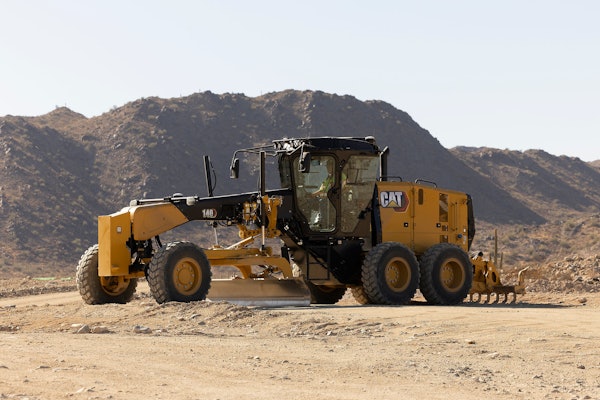Contractors in the past could hardly be faulted for their reluctance to buy used equipment through Internet auctions. Given the cost of the equipment and its mechanical complexity, few contractors early on jumped into the game with both boots.
But in the past two years the weaker players in the online marketplace folded. The companies with stronger business models survived and contractors are warming to this new method of acquiring used equipment. According to Ritchie Bros. Auctioneers, which started taking Internet bids simultaneously with its live auctions in March 2002, Internet buyers are now purchasing between 10 to 15 percent of the equipment sold at its auctions.
The key has been overcoming the buyers’ fears of getting stuck with an expensive iron lemon. What’s more, the online auction business has helped push the proliferation of equipment pricing and buying information, turning the used equipment marketplace from a guessing game into more of a science.
The benefits of online auctions
Convenience is the biggest benefit for buyers at online equipment auctions. “People are finding this is a very effective use of their time,” says Bob Armstrong, vice president of Internet services at Ritchie Bros.
Matt Dahm, cofounder and director of marketing at IronPlanet, an Internet-only auction site started in 1999, agrees. “Everybody is starved for time,” Dahm says. “But now they can hop on our website and see the inspection reports for 20 excavators in a matter of 10 minutes.” Internet auctions also eliminate the cost of travel to and from an auction.
Internet auctions are particularly efficient when the contractor is only looking for a limited number of pieces. If a contractor is only interested in two pieces out of an entire auction and one is going up for auction at 8 a.m. and the other at 8 p.m., the buyer can simply log onto the auction website at those specific times, spend ten minutes bidding and spend the rest of the day working, Armstrong says. At Ritchie Bros., the smaller auctions in particular are getting a boost from the online component, he adds, since contractors have a harder time justifying travel to an auction with fewer pieces – a barrier the Internet erases.
The ability to gather information and strategize purchases before an auction also offers benefits. “You’ve got more information at your fingertips and you can slice and dice it to your criteria in less time,” says Bill Angrick, chairman, CEO and one of the founders of Liquidation.com, which helps commercial and government clients to dispose surplus property and equipment in online auctions. “If you’re not taking advantage of that and you are a buyer I think you’re going to pay more in terms of cost and time to procure. And if you are a seller and you’re not taking advantage of these online auctions, you are not going to be getting the best returns on your assets,” he says.
The buyer’s number one concern – lemon protection
Most people won’t worry about getting ripped off bidding online for a $6 Beanie Baby. But what about a $100,000 dozer?
IronPlanet knew from the start this perception of uncertainty would demand a solution before contractors would feel comfortable using Internet auctions. Its solution was to offer exhaustive inspection reports, dozens of photos, oil and hydraulic fluid analysis and what it calls an Ironclad Assurance. This guarantee states that what you see is what you get or they’ll either refund the purchase price, including transportation charges, or pay to have the equipment repaired.
The company sends trained, experienced inspectors to photograph and examine every piece it sells. “Some of these inspection reports can be tough but fair to a piece that has not been well maintained,” Dahm says. “But that’s what today’s buyers want.”
IronPlanet also allows potential bidders to physically inspect a piece if they want, but few of its customers have done so. “It’s a very small industry,” Dahm says, “and if a company doesn’t stand behind its word, that company won’t last long.”
Ritchie Bros. encourages customers to get out and touch the iron, even if they go back to their offices and bid over the Internet. “We really want them to see the piece,” Armstrong says. “We provide three or four digital photographs and a fairly brief description of each piece. But we do not give our interpretations of the quality. We encourage buyers to form their own opinion. There is no special treatment for the Internet bidder. They can go to the sales site before the auction, hire an inspector or send their equipment manager.”
In many cases the sellers of equipment have well documented maintenance and service records, says Don McEachern, customer relations manager at Ritchie Bros. These can be faxed to customers or reviewed at the sales site; and buyers can also call the sellers and discuss the condition and work history of the equipment. Ritchie Bros. also gives customers two years worth of historical price data from its website for free, says McEachern.
Sellers’ advantages: more customers and faster money
The Internet is nothing but gravy for the sellers of equipment. The number of buyers increases as does the geographic spread, which inevitably lifts prices. “Our buyers come from everywhere in the United States, Canada, South America, Puerto Rico, Guam and in some cases Europe,” Angrick says.
And with Internet-only auctions, pieces can be flipped fairly fast.
“We sell your equipment from your backyard,” Dahm says. “So it only takes three to five weeks to turn a piece of equipment into cash.” The same time frame holds true at Liquidation.com. “We are much faster than conventional auctions in creating the market,” Angrick says. We can take one seller with one piece of equipment and make it a success.”
Seller’s concern: unqualified buyers
Perhaps the biggest difference between online heavy equipment auctions and popular public auction sites like e-bay is the degree to which the heavy equipment auctioneers screen and qualify their participants. With millions of dollars at stake, all three of the companies accept only known and qualified buyers.
“We are very careful about who we allow to use the system,” says Armstrong. “We don’t want any fraud, we don’t want any problems with our Internet bidders – they are competing directly against the guys who are taking the time to go to the live site. You have to be a customer who is well known to Ritchie Bros., or put down a 25-percent cash deposit before you are allowed to bid.”
At IronPlanet, Dahm says such restrictions protect everybody involved in the process. “Before you can bid you need to accept our terms and conditions. Then we request basic banking information, we call and confirm the information and then, once approved, the customer can bid. To further protect our sellers the equipment doesn’t ship until the buyer has deposited the funds into a secure third-party bank account.”
Few if any reservations
Another point of difference between online heavy equipment auctions and popular consumer-type auctions is, for Ritchie Bros. and Liquidation.com at least, the equipment is sold without reserves (the auction industry’s term for a minimum asking price). IronPlanet uses what it calls an opening bid. “It’s a public reserve price that’s low enough to get the bidding started, but it’s not unreserved so our sellers are protected,” Dahm says.
Selling without reserves may seem risky to the seller, but the market, especially with the big audience an Internet auction generates, rarely disappoints. “We have rich transaction information and feel confident that when we attract 60,000 buyers to the product or auction that we’re going to get roughly a market-clearing price,” says Angrick.
The democratization of information
With all the information available online, not only are buyers guessing less about the value and condition of equipment, they are also able to target specific equipment needs, set a maximum allowable price and let the market find them.
“We’re having north of 150,000 searches a week,” Armstrong says. “That’s from people going in and seeing what’s available for auctions. Customers are showing up at our sales site holding printouts from our website having already done their thinking and planning. They hit the ground running thanks to the information available on the website.”
IronPlanet and Liquidation.com allow customers to submit standing requests for a certain type of equipment at a certain price. “It can be as specific or as general as you want,” Dahm says. “Then we notify them when a piece fitting that description has been inspected and they can check out the inspection reports and make a decision whether to participate in the auction. It allows them to be much more disciplined and strategic about how they buy their equipment.”
The changing dynamic of the marketplace
With this explosion of information has come a new type of marketplace with smarter buyers and and a much bigger audience.”Five or ten years ago, some people had more information than others, so some people had a negotiating advantage,” Armstrong says. “Largely due to the Internet, people have access to historic selling prices of equipment and also what else is available in the market,” he says.
The end result is a more efficient used equipment marketplace and the blurring of lines between the retail and auction channels.
“We’re getting more new equipment coming into our auctions, Armstrong says. “People are realizing that a Ritchie Bros. auction is an efficient and effective way to sell equipment and all our customers are lining up to buy it, so the manufacturers are happy to use us as a distribution arm. As a result even more buyers are attracted to our auctions.”
Real customer service and support
Given the high dollar amounts transacted in online equipment auctions, buyers and sellers are treated quite a bit better than most consumer Internet customers. Online equipment auctions may be high tech, but you can pick up a phone and get a lot of information and service anytime you inquire about a piece of equipment.
“We realize that to evolve people’s behavior you have to have all of the traditional resources to support that change, including sales directors and a customer service department where a buyer can call a toll free number and get direct support,” Angrick says.
If you are not yet ready to throw down some cash, you can watch any of these companies’ auctions in progress without having to bid. You can qualify for bidding by logging on to the respective websites whenever an auction is scheduled. The websites are www.rbauction.com, www.ironplanet.com and www.liquidation.com.






